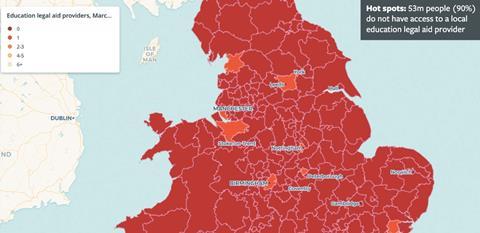The Legal Aid, Sentencing and Punishment of Offenders Act has left legal aid in tatters, the Law Society has declared on the 10th anniversary of the legislation coming in to force – revealing updated heat maps showing ‘expanding’ advice deserts.
The Society today publishes maps highlighting the ‘vanishing availability’ of legal aid across housing, welfare, education, community care and immigration since the 2012 act took numerous areas out of scope. The maps are based on data compiled from the directory of providers published by the Legal Aid Agency.
According to Chancery Lane, the number of legal aid cases to help people get early advice dropped from almost a million in 2009/10 to just 130,000 in 2021/22. The number of advice agencies and law centres doing this work has fallen by 59%.
The Society said millions of people now live in areas where there is no longer access to the help and advice to which parliament says they are entitled.
According to the Society’s updated maps:
- 53m people (90%) do not have access to a local education legal aid provider;
- 49.8m people (84%) do not have access to a local welfare legal aid provider;
- 42m people (71%) do not have access to a local community care legal aid provider;
- 39m people (66%) do not have access to a local immigration and asylum legal aid provider; and
- 25.3m people (42%) do not have access to a local legal aid provider for housing advice, a figure that has grown 5% since 2019.
Society president Lubna Shuja said: ‘Legal aid can be the difference between a family staying in a safe home or being made homeless, having protection from domestic abuse or being trapped in an abusive relationship. Legal aid can help a child with disabilities get the education and support they need.
‘For rights to be real, everyone who qualifies for state-funded legal advice must be able to get that advice when they need it, so that they can uphold and enforce their rights.’
Shuja welcomed the government’s civil legal aid review but said the timetable was too long ‘as services are collapsing now’.
A Ministry of Justice spokesperson said: ‘Everyone in England and Wales can access legal help and advice either face-to-face or through the civil legal aid telephone service. Last year, we invested £813m to make sure civil legal aid gets to those who need it most and are reviewing the sector to ensure the system is sustainable well into the future.’
The ministry said the LAA regularly monitors capacity in the legal aid market and provision of services, and takes immediate action when gaps appear, working with providers to ensure provision nationally. Additionally, legal advice on civil matters including housing, debt, discrimination and education is available wherever people are through the Civil Legal Advice telephone service.






























9 Readers' comments